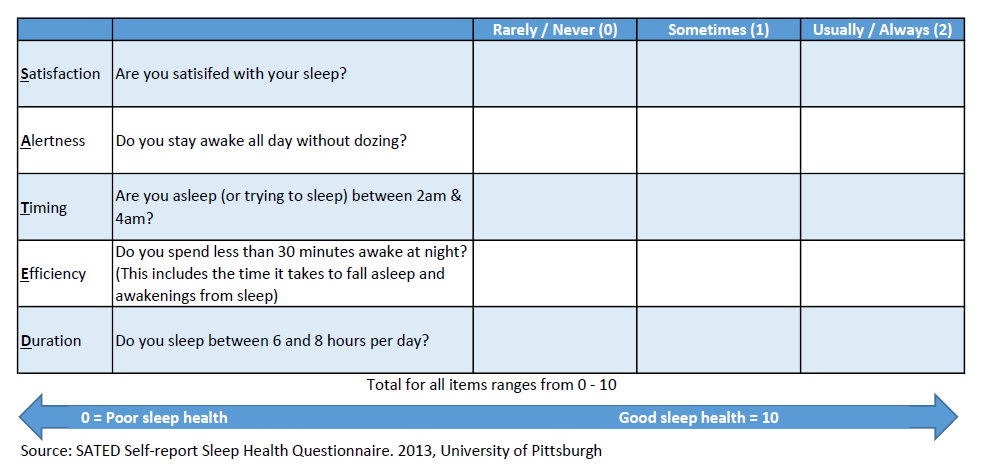Sleep - the most neglected aspect of good health
Reading time: 5 minutes
Before you read on, try to calculate how many hours sleep you got last night. (This doesn’t include time lying in bed looking at your phone!) Now, grab a pen & paper and rate yourself on the sleep survey below:
I’m sure you have an idea already, but your responses to this survey will highlight whether sleep is something you need to improve on during the programme. We should be aiming for 7-9 hours sleep each night, with 7 being the minimum required to keep health in check, according to The National Sleep Foundation. A whopping 74% of UK adults don’t achieve this (Sleep Council, 2017).
Modern life has affected our sleeping patterns. With the introduction of On Demand television, unlimited internet access and never-ending social media feeds, we have more and more reasons not to go to bed. Interestingly this is proved by the fact that in 1910, on average people slept 9 hours per night!
We try to cram as much into our day as possible and it’s often seen as a badge of honour to tell people how busy we are and how little sleep we have had. In fact, the desire to get a decent night’s sleep is often stigmatised as laziness. Humans are the only species that deliberately deprive themselves of sleep.
Why do we need sleep?
No aspect of our biology is left unscathed by sleep deprivation. Sleep provides an opportunity for the body to repair and rejuvenate itself. It has been found that many of the major restorative functions of the body like muscle growth, tissue repair, protein synthesis, and growth hormone release occur mostly, or in some case only, during sleep. In short, sleep is a necessity for our bodies to function at their best.
In terms of our fitness, recovery is vital for progression. When training and pushing our bodies hard we are breaking down and tearing muscle fibres. We must rest to give the body time to repair - sleep is an important part of this.
Additionally, it has been proven that lack of sleep means we are more likely to experience increased hunger and cravings, and therefore, over eat. In our ‘Snacking for Success’ blog we talk about the hormone ‘ghrelin’ which tells our brain we’re hungry. When we haven’t had enough sleep, ghrelin levels rise, and leptin levels (a hormone which signals a sense of feeling full) fall. Not only do we feel hungrier, it has been proven that we are likely to reach for high-carb, high-calorie foods. This is the body’s way of finding a quick energy boost and getting you through the next hour. A study by researchers at King’s College, London, found that if you deprive people of sleep, they consume, on average, an extra 385 calories per day. In his book “Why We Sleep” Matthew Walker states that in addition to how hungry we feel and the types of food we choose to eat when we are sleep deprived, “the less an individual sleeps, the less energy he or she feels they have, and the more sedentary and less willing to exercise they are”. Sleep can have a profound effect on how we feel about food, and ultimately, our waistlines.
Tips on getting a better night’s sleep
If you scored 5 or below on the sleep survey above, or you do not feel sufficiently rested, consider the following tips which might help:
Turn off your computer and bright lights half an hour before you go to bed. It’s well known that blue light from electronic devices impairs sleep. It interferes with the body’s ability to produce melatonin, which ensures deep sleep and can help regulate metabolism. Many phones now have a ‘downtime’ setting, where you can preset a nightly schedule for time away from the screen. An extra half hour sleep a night instead of scrolling through Facebook would give us 3.5 hours more sleep a week
Reduce (or even better, avoid) caffeine intake after 2pm. Caffeine is a stimulant and stays in your system for many hours
Make sure you are a comfortable temperature in bed (in terms of what you are wearing and the tog of your duvet). 18 degrees Celsius is ideal for a bedroom
Ensure your bedroom is completely dark to help you achieve a peaceful night’s sleep. This may mean getting blackout blinds or wearing an eye mask
As you would do for your children, establish a regular bedtime routine. Putting rituals in place 30 minutes before bed will help you calm down, unwind and let your body know it’s time to rest
Make sleep a priority. Set an intention for a time to go to bed & stick to it. If 7 hours is unrealistic right now, aim to work your way up
Try keeping a Sleep Diary. Record the time you go to bed and when you wake up for two weeks. You can then see whether you have a good sleep pattern or whether you could be stricter with this
Try to implement some of these ideas over the remainder of the programme and give your body a chance to feel better.
Sleep tight!


